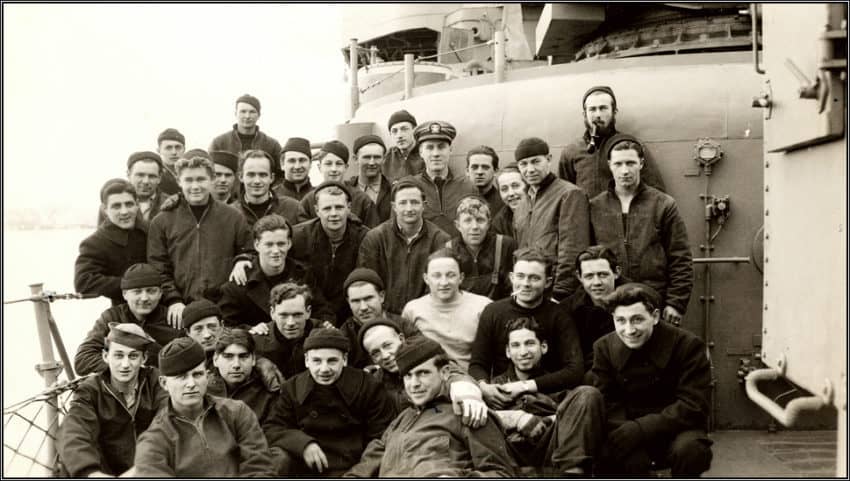
When the United States became aware of Japanese plans to send a supply convoy to their forces on the Aleutian Islands of Alaska, U.S. Navy ships commanded by Rear Admiral Charles McMorris were sent to prevent this. The fleet consisted of the heavy cruiser Salt Lake City, the light cruiser Richmond and the destroyers Coghlan, Bailey, Dale and Monaghan. Above are shipmates from the Bailey. Click to enlarge.
By: Phil Kohn. Dedicated to the memory of his father, GM3 Walter Kohn, U.S. Navy Armed Guard, USNR, and all men and women who have answered the country’s call in time of need. Phil can be contacted at ww2remembered@yahoo.com.
On March 26, a Japanese cruiser force (four cruisers, five destroyers) and an American cruiser squadron (two cruisers, four destroyers) engage in a four-hour battle off the Komandorski Islands in the Bering Sea. Both sides have a cruiser badly damaged, but the Japanese withdraw, preventing them from reinforcing troops on Attu Island in the Aleutians. The battle is unique in that it involves neither submarines nor airplanes.
In Tunisia, British Gen. Sir Harold Alexander, commanding the Allied 14th Army Group, on March 27 sends the U.S. Army’s 34th Infantry Division to seize the Foundouk Pass, in the north central part of the country. Heavy artillery fire, however, halts the Americans’ advance. In Washington, D.C., the War Department announces the development of a new weapon for the U.S. Army: a recoilless, anti-tank rocket launcher that can be carried by one man. It comes to be called a “bazooka,” named for its resemblance to a musical instrument (also called a bazooka), invented by actor/comedian Bob Burns and popular with jazz musicians in the 1930s. The RAF drops 1,000 tons of bombs in 50 minutes on Berlin via three waves of 100 bombers each. It is the heaviest raid yet on the German capital.
Commanded by British Lt. Gen. Kenneth Anderson, the newly organized First Army is an amalgamation of American, British and French troops that had been involved in the “Operation Torch” landings. The Italian freighter Caterina Costa — loaded with gasoline, ammunition, tanks and other equipment, and on fire for hours (possibly due to arson) — explodes in Naples harbor, killing over 600 people and injuring almost 3,000. No effort was made to tow the ship out of the harbor because the appropriate government official could not be found to authorize the action.
In Asia, British and Indian troops on March 29 begin to withdraw from Arakan, in western Burma, under heavy Japanese pressure. Meat rationing begins in the U.S., with purchases limited to 28 ounces per week per adult (less, for children). Poultry is not affected by the rationing order.
In North Africa on March 30, elements of the British Eighth Army — having won the Battle of the Mareth Line — break through at the Gabès Pass, over 100 miles into Tunisia. They head north, following the retreating German and Italian forces. The United Kingdom announces that it is suspending Arctic convoys to the Soviet Union because it cannot provide enough escorts to guard against the increasing number of German warships in Norway. In Vienna, Austria, Sister Mary Restituta, a Roman Catholic nun working as a surgical nurse, is executed by guillotine. A longtime vocal critic of the Nazi regime, she has been tried and convicted of “high treason.” Her execution, despite an appeal for clemency, is ordered by Martin Bormann, head of the Nazi Party Chancellery and Hitler’s personal secretary. According to Bormann, the nun’s execution will provide “effective intimidation” for others who might want to resist the Nazis.
In Papua-New Guinea, a U.S. Army battalion on March 31 occupies positions around Morobe, near the Waria River. The coastal village has been held by the Japanese since 1942. In New York City, Rodgers & Hammerstein’s musical play “Oklahoma!” debuts at the St. James Theatre on Broadway and is an instant hit.
Attempting to halt inflation, President Roosevelt on April 1, 1943, freezes wages, salaries and prices in the U.S. At this time, meat, fats, canned and bottled goods, butter and cheese, as well as gasoline and shoes, are all being rationed. A secure telephone system, developed by AT&T Corporation’s Bell Labs, goes into operation between Washington and London. The system allows President Roosevelt and Prime Minister Churchill to speak with each other without being understood by any possible wiretappers. The Japanese begin “Operation I-Go,” a 350-airplane, joint Army Air Force-Navy bombing offensive against Allied shipping.



